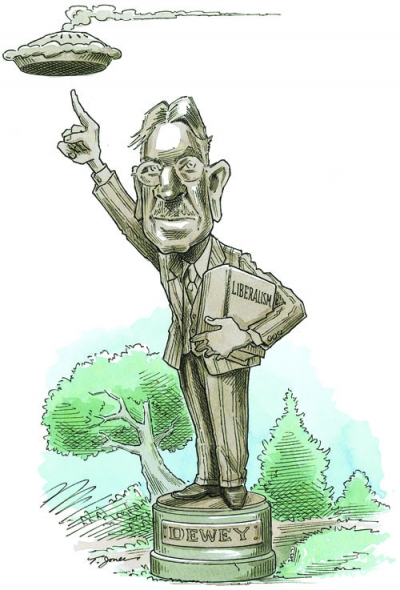There was a delicious irony in the Center for American Progress (CAP) choosing Tax Day, April 15, to publish its new defense of the progressive intellectual tradition in the United States. The deep intellectual confusions of that movement were caught in its opening salvo, which quoted a famous aphorism of Justice Oliver Wendell Holmes: “Taxes are the price that we pay for a civilized society.”
The CAP study linked that quotation to the U.S. Department of Treasury website, which had the good sense to observe that the Holmes quotation “tells us nothing about the form or levels of taxation.” Neither did CAP, it turns out. But the issue matters. Treasury reported that when Holmes penned those words in 1902 the tax burden stood at 1.3 percent of gross domestic product. By 2000 the tax burden exceeded 20 percent, a number that looks almost blissfully low in light of the massive new Obama taxes. Some taxes are necessary for civilization, but surely not every tax.

As I read through the first of the three CAP reports, by John Halpin and Conor P. Williams on the “progressive intellectual tradition in America,” I found no systematic defense of our current high rates of taxation. Instead, the authors dished out a Cook’s tour of the major tenets of the progressive movement that attacked any traditional theory of natural rights (which date back to Roman times), without saying where and why that theory broke down, or what should have been done to fix it. Nor did our authors explain what was wanting in the classical liberal efforts to use the antitrust law to counteract horizontal restraints on trade, or rate regulation to deal with the problem of large network monopoly industries, such as railroads and communication, in which competitive markets are not possible.
Instead they strung together extensive, high-falutin’ quotations from writers spanning Charles Sanders Peirce to William James to John Dewey to clinch the case for the superiority of the progressive model. Pity that not one of those distinguished authors knew anything about how any major social institution operates. Thus Dewey’s supposedly pragmatic, down-to-earth assessment of the moribund classical liberal synthesis omitted any reference to the falling accident rates, higher incomes, and longer life expectancy across the board that occurred just as he was writing. Progressive writers, in fact, have always shown remarkably little interest in tracing out the practical consequences they claim matter most.
Recently I reviewed the famous but inept brief that Louis Brandeis wrote in Muller v. Oregon that helped persuade Justice Brewer (a conservative, no less) to sustain an Oregon minimum-wage law for women only—a law whose practical consequence was the prompt dismissal of the very women the law was supposed to protect. The progressive insistence that somehow the laws of supply and demand don’t apply to large corporations is one of their great intellectual weaknesses; the passage of time has not cured it.
Instead, the progressive remains trapped in Dewey’s misguided mindset that our basic concept of liberty has to be defined anew in each generation. All classical liberals agree that Dewey was correct when he noted that, historically, liberty requires freedom from chattel slavery, serfdom, and oppressive governments. But what, pray tell, did he mean by “liberation from material insecurity and from the coercions and repressions that prevent multitudes from the participation in the vast cultural resources that are at hand”?
Beats me. Dewey offered no acknowledgement of the entrepreneurs—John D. Rockefeller, Leland Stanford, Johns Hopkins—who helped create these vast resources and founded great universities out of their wealth. Nor was he aware that what he regarded as a release from “material insecurity” almost always requires some extensive transfer program, which in the short term may have its desired effects but in the long run must always fail. Think Social Security, Medicare, and pension plans for state union employees. Quite simply, Dewey (like modern progressives) had no awareness of the risk that redistributive taxes will reduce overall level of wealth and drive out the voluntary forms of redistribution which, dollar for dollar, have a far higher rate of return than any government program.
Dewey’s aimless and imprecise reference to “coercions and repressions” had no discernible content when divorced from the traditional concerns with force and fraud. Redefine an old term and its new, loose meaning will lead you astray, so that in short order the refusal of an employer to deal with a monopoly union becomes magically transformed into an interference with workers’ rights of voluntary association. Such woolly conceptions bring in their wake monopoly unions, agricultural cartels, and minimum-wage laws—the last of which may now apply to summer interns. But of these risks, our authors breathed not a word. Nor did the dangers of faction, against which the framers sought to guard, receive more than scant attention.
It is all too tempting to attack classical liberals for their outdated attachment to natural law, supposed extreme individualism, and rigid constitutional conceptions. But today’s progressive legacy—the creaking structures of government at both the federal and state level—makes you want to go out and attend the nearest Tea Party rally.







